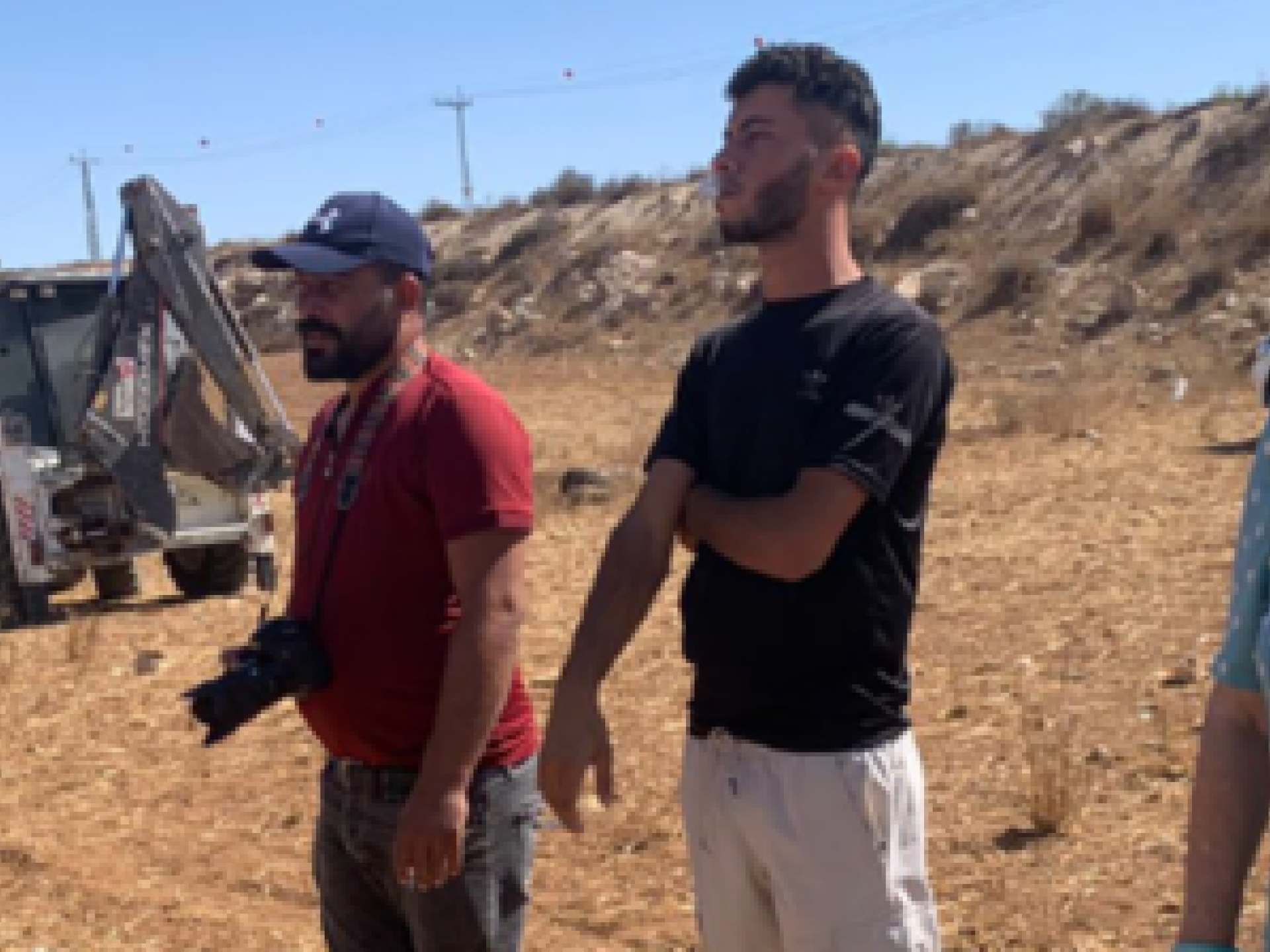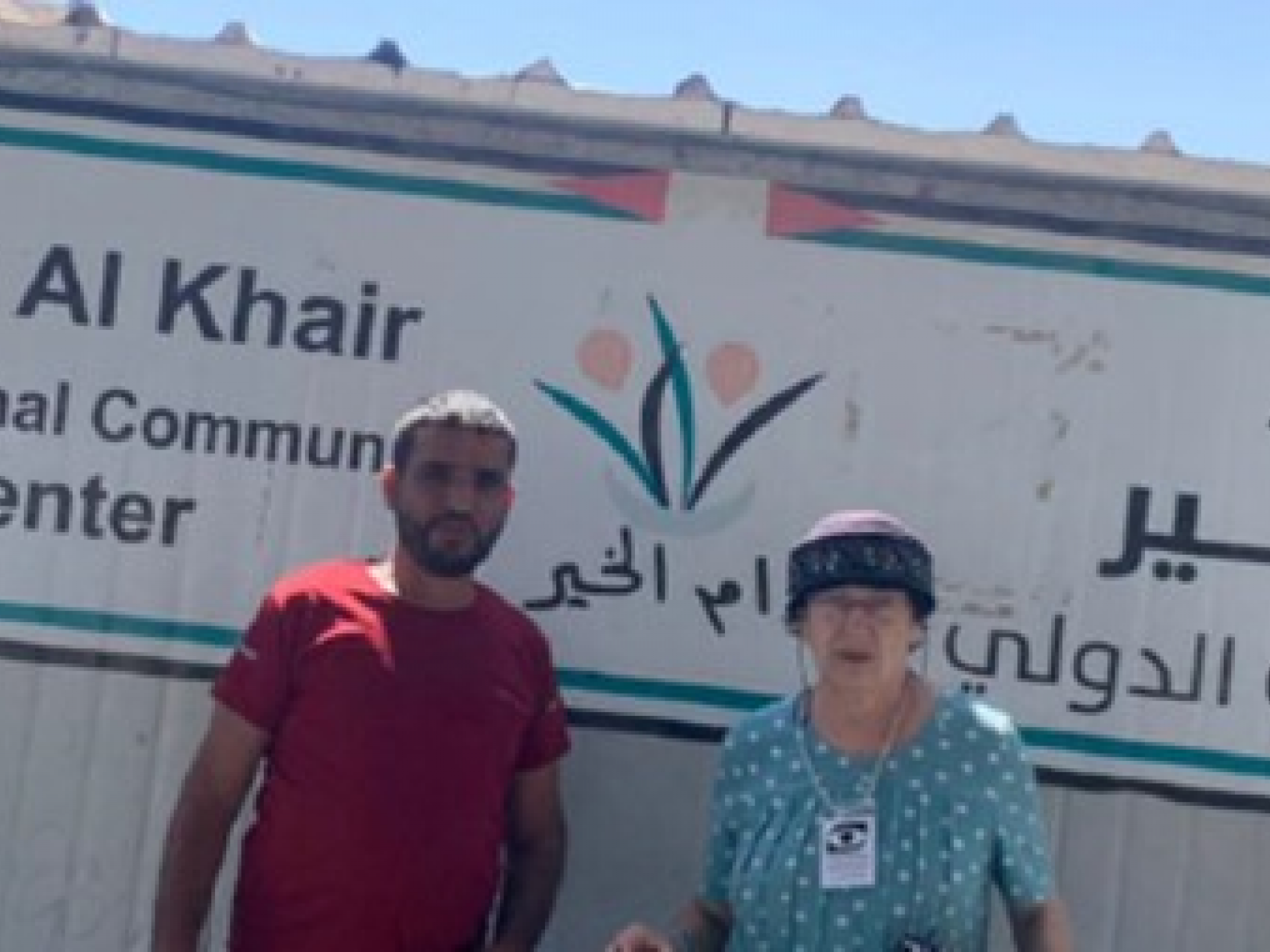South Hebron Hills – you can see Ben Gvir's and Smotrich's handprints
Signs of Smotrich and Ben Gvir in the West Bank
The Civil Administration destroys an irrigation pipeline of the Bedouins // carries out house demolitions without a demolition order or a court order // plans and carries out expansions of settlements on Palestinian land.
destroys an irrigation pipeline of the Bedouins // carries out house demolitions without a demolition order or a court order // plans and carries out expansions of settlements on Palestinian land.
We drove on road 317 towards the north and in front of us on the left, south of the settlement of Susiya, we saw a gathering and a truck of the Civil Administration with a terrible device on it to destroy the irrigation pipes of the village of Wadi Jahaish. The water pipe was thoroughly cut into small pieces to prevent any future use. The small gathering also included vehicles belonging to the Civil Administration, Border Police officers and soldiers, as well as Palestinian activists who also took pictures: Nasser from Susiya, Jihad, his brother, from Susiya (head of the council), Hamdan from Susiya, Eid Mam al Khair, Bassel from At-Tuwani.
The demolitions (and this is not the first) are carried out without a demolition order and without a court decision. "What, you want us to steal water? How will we survive? We are like slaves..."
Nasser claims that these are private lands with Kushan on them. are probably intended for the expansion of the Susiya settlement. The field itself is not damaged, but the houses are. The Palestinian activists said that the Civil Administration claims that they are being pressured to increase demolitions by Ben Gvir, Smotrich and Regavim.
We returned to the road and continued north to make a U-turn where there was no dividing line, so as not to get into trouble. The vehicles of the administration and the army obviously do not adhere to this law. We are reminded that Palestinians are not allowed to go down with a vehicle towards Jimba, the vehicles are confiscated.
Muhammad said that Bassel will soon marry an educated relative of Nasser from Ramallah, who will come to live in At-Tuwani. We all send warm wishes to the couple.
Let's fake it: instead of Apartheid they said the State of Judah.
We continued for a short visit to Nasser in Susiya. His sister, who lives further west near the military base, said that the army trains the settlers in a weapons range. Once again, we are reminded that Susiya exists only thanks to American pressure. They also constantly suffer from threats of house demolition, confiscation of agricultural equipment, etc.
The important infrastructures - water, electricity, telephone - are close to them, but they are intended for the archaeological site and the military camp. When each outpost receives these infrastructures including bus services, the Palestinian Susiya returns and asks to connect to the water and receives no answer. Avoid mentioning the word apartheid, it is considered anti-Semitism. Here it is "the state of Judah". The police cannot enforce the law here, the army does not serve the state but the settlers.
We bring Eid home to Umm Al-Khair. His Hebrew is excellent. He takes us on a tour around the village so that we understand the new situation. We also met with the head of the council, Khalil.
Eid: "I don't hate Jews and I don't hate settlers, I'm just angry about the government's policy."
The residents of Wadi Jahaish are Bedouins from the Jahlin tribe, originally refugees from the Arad region. In the 1950s they bought the land from the residents of Yatta. The village was declared illegal, even though it existed before the establishment of the Carmel settlement adjacent to it to the west. Eid emphasizes that the people of the village have never been involved in terrorist activities and testifies that he does not hate Jews or settlers, he is just angry at the government's policy. The pressure on the village to vacate began in 1980 but has now increased greatly under the new administration. Demolition orders were issued for all the houses, and they have already been demolished 16 times. They bring water in tankers from other Bedouins, who are allowed to buy water from Mekorot. They destroyed a water hole at the beginning of the summer. And of course, they argue against them that they are inside fire area 917 (a continuation of fire area 918 south of Masafer Yatta).
How to speed up ethnic cleansing: closing off the village from all sides and suffocating the livelihood of its residents
The Carmel settlement is adjacent to the village to the west. The settlement is networked with security cameras and as we walk along the dirt road that separates it from the village, Eid warns me to stick to the village fence, at a safe distance from the settlement fence. As I recall, the settler Yaakov Goldstein from the extension neighbourhood (which pulls the settlement towards the southeast) sued Eid's father years ago for the smell coming from his tabun that bothered him, for the amount of 200,000 NIS. It can't be proven, but in fact they destroyed the tabun and there are no more tabuns in the village.
A Jew with a kippa crosses the village in his car from north to south. Eid explains: This is not a settler, he just works for the settlers. And so, he shortens the way without getting confused and marks the Jewish ownership here.
South of the village, the Civil Administration announced the establishment of a new neighbourhood of the Carmel settlement, next to the extension neighbourhood. The Israeli flag flies on a hill to the east. They hold a Shabbat reception prayer there every week, with the unfounded claim that there was an ancient synagogue there.
To the north of the village, from the road going up to Zwidin, you can see the Shorashim-Carmel farm of the settler Shimon that closes the village. He walks around the area and threatens. Of course, you must not go off the road towards his farm, nor approach it from the direction of the village, not even with the sheep. The farm has existed for about eight months and has a barn and sheep. The farm even has an 'Arov Shabbat' posts with a thread on them that mark the area of space for the residents of the farm where they can move and carry things on Shabbat.
Latest news: this is how voluntary transfer is encouraged in practice
In 2019, the Civil Administration declared all the lands as state lands (only for Jews), from which the Palestinians should evacuate. We gave 80 days to present an objection, this is not enough time, and there is no money for lawyers either. Yesterday afternoon (September 27, 2023) Shimon appeared from Root Farm with soldiers and showed a map: 800 dunams were taken from the village, it is forbidden to go out to pasture, it is forbidden to use the water tap in the area from which they watered the sheep. They must uproot their trees in this area.
The result: not being able to graze the herds, on which the livelihood is based, they are confined in a barn and must be fed expensive food. If they leave with the herds to the north, they will not be allowed to return and will be deported. If they are arrested, there is no money to be released from arrest. The solar panels have not been touched yet. Once a week there is a drone that takes pictures of everything. It is enough for one resident to get discouraged and leave, it will cause a general departure. This is area C, administratively belonging to the weak Palestinian Authority that cannot help them. They depend on the help of international organizations.
We visited "Shig" (the meeting place of the 'parliament' of the village men), in the well-kept complex that used to be a kindergarten. You see how beautiful this entire Palestinian settlement could have been if they had left it alone.
We met Italian volunteers and a group from Tel Aviv - Adish company for manufacturing clothes (in partnership with Palestinians in Ramallah and New York) in which traditional fabrics are combined. They go against the public's indifference to what is happening here, they have offered to finance one of our sea days next summer.


